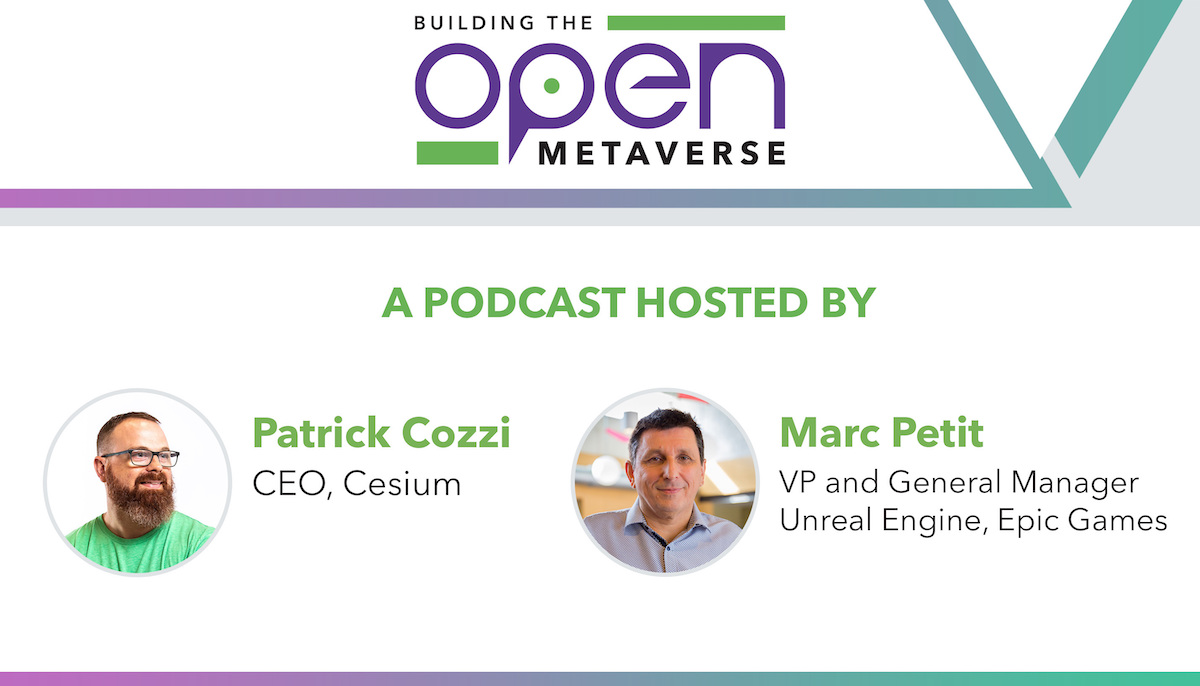Center City-based 3D geospatial company Cesium is again working with Fortnite creator Epic Games, this time on a new project exploring the metaverse. So what does that … mean?
The companies teamed up first earlier this year on Cesium for Unreal, a free, open-source plugin that delivers high-resolution 3D geospatial technology and real-world data for any type of application. Now, they’re diving into building the metaverse — the concept of “the next generation of the internet” made up of virtual 3D spaces linked into a perceived virtual universe — in a new podcast. Cesium CEO Patrick Cozzi and Marc Petit, VP and GM of Unreal Engine at Epic Games, first dove into the topic at the SIGGRAPH conference this past August.
“The session was inspiring and productive, and it was clear that the conversation needed to continue with more breadth and depth, so we started the ‘Building the Open Metaverse‘ podcast,” Cozzi wrote in a recent blog post. “We hope it will inspire new ideas, facilitate collaboration, and encourage all metaverse participants, from developers to consumers, to contribute in meaningful ways.”
In the first episode, Cozzi and Petit are joined by Matthew Ball, metaverse investor and author of “The Metaverse Primer,” and Samantha Wolfe, founder at PitchFWD and an adjunct professor at NYU Steinhardt. The first three episodes of the series dropped on Oct. 28.
The concept of the metaverse is just barely entering the mainstream, according to the group. Mark Zuckerberg’s announcement last week that Facebook’s corporate name would be rebranding to Meta piqued the public’s consciousness of the term, but it’s in no way universally understood, Wolfe said.
When prompted to explain the metaverse in layman’s terms, Wolfe said this:
“Remember how the internet changed interactions and mobile phones changed the way that people operate? With the next generation of computing, computers will be able to see the world, and you’ll be able to experience the world differently,” she began. “And now we’re getting into where you can. … If you wanted to sort of escape to another virtual world, you can do that. [The idea of the] open metaverse is that it’s all going to be sort of interconnected and simple and easy to use.”
Ball went on to explain that it’s not just important to understand the concept of the metaverse, but why we would care about it at all. Its 3D-rendered, real-time simulations bring a different level of interaction to the ever-present internet access we currently have.
“It’s important to recognize that humans never evolved for 2D interaction. We didn’t evolve to communicate through a Zoom client,” Ball said. “And so I think the optimistic perspective is not just that the metaverse is a more intuitive way to interconnect with the internet or computing, but it’s also a much better forum for connection for socializing.”
Building the Open Metaverse’s second and third episodes hit on the open standards of the metaverse and its cloud infrastructure. You can find the podcast on Spotify, Apple Podcasts or Google Podcasts, or watch a video version on YouTube. Check out the first episode, “What is the Metaverse?” below, and look for bi-weekly episodes coming soon.
Before you go...
Please consider supporting Technical.ly to keep our independent journalism strong. Unlike most business-focused media outlets, we don’t have a paywall. Instead, we count on your personal and organizational support.
3 ways to support our work:- Contribute to the Journalism Fund. Charitable giving ensures our information remains free and accessible for residents to discover workforce programs and entrepreneurship pathways. This includes philanthropic grants and individual tax-deductible donations from readers like you.
- Use our Preferred Partners. Our directory of vetted providers offers high-quality recommendations for services our readers need, and each referral supports our journalism.
- Use our services. If you need entrepreneurs and tech leaders to buy your services, are seeking technologists to hire or want more professionals to know about your ecosystem, Technical.ly has the biggest and most engaged audience in the mid-Atlantic. We help companies tell their stories and answer big questions to meet and serve our community.
Join our growing Slack community
Join 5,000 tech professionals and entrepreneurs in our community Slack today!

The person charged in the UnitedHealthcare CEO shooting had a ton of tech connections

From rejection to innovation: How I built a tool to beat AI hiring algorithms at their own game

Where are the country’s most vibrant tech and startup communities?



